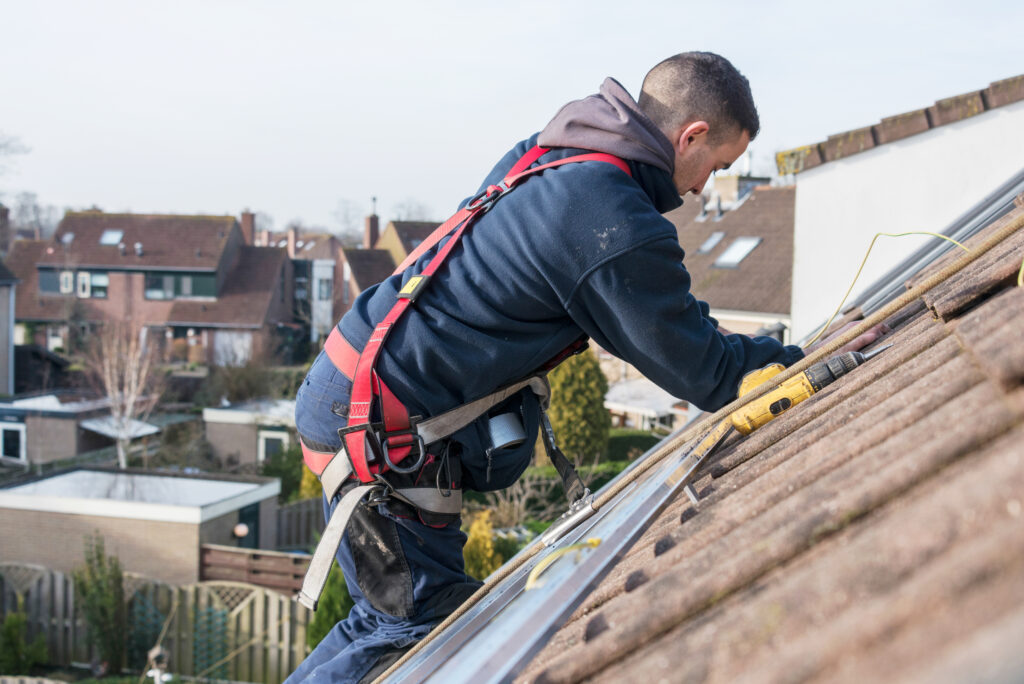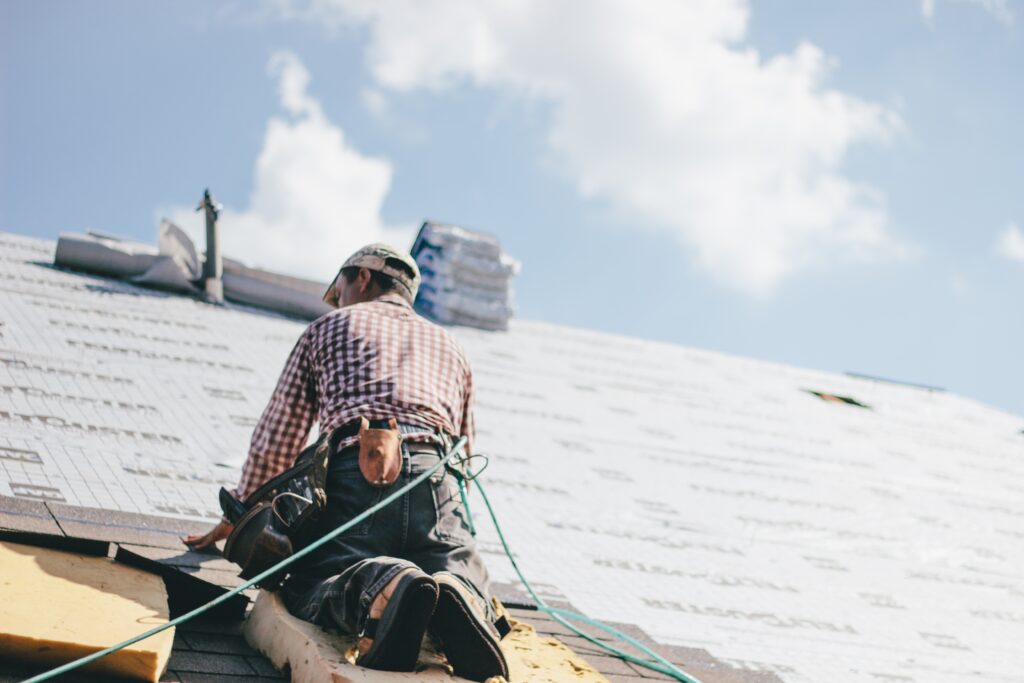Main Takeaways:
- Always verify that a roofer is licensed, insured, and able to show proof of coverage to protect your home and finances
- Experience and local references help confirm a roofer’s reputation, workmanship quality, and reliability
- A thorough inspection and detailed estimate should include roof structure, ventilation, materials, labor, permits, and cleanup
- Understanding materials like shingles, tile, metal, and flat roofing membranes helps homeowners choose the right solution for their climate and budget
- Warranties on both materials and workmanship are essential for long-term protection and peace of mind
- Clear communication, safety practices, property protection, and jobsite cleanliness are strong indicators of a professional roofer
- Financing options, solar compatibility, and energy-efficient roofing features can make upgrades more affordable and future ready
Your roof protects your home from everything the weather throws at it—rain, sun, wind, and time. When it’s time for repair or replacement, choosing the right contractor can make all the difference between a stress-free experience and years of frustration. Before signing a contract or agreeing to a quote, it’s essential to know the right questions to ask a roofer.
Roofing is a significant investment, and not all contractors have the same level of skill, training, or commitment to quality. Understanding what to ask will help you find a roofer who’s qualified, reliable, and transparent about the process.
Below, we’ll explore the most important questions to cover before hiring a roofing company—and why each one matters.
1. Are You Licensed and Insured?
One of the first questions to ask a roofer is about their credentials. A legitimate roofing company should be fully licensed, bonded, and insured in your state or region.
A valid license ensures that the contractor meets local and state requirements for roofing work. Insurance, on the other hand, protects you from liability if an accident occurs during the project. Without insurance, you could be held responsible for worker injuries or property damage.
Ask to see physical proof of both general liability insurance and worker’s compensation coverage. A reputable roofer will have no problem providing these documents.
2. How Long Have You Been in Business?
Experience is one of the best indicators of a roofer’s reliability. Companies that have been around for years—sometimes decades—have likely built a reputation for quality workmanship and customer satisfaction.
You’ll want to ask how long they’ve been operating under their current business name, not just in the industry. This can reveal whether they’ve had to rebrand due to poor performance or legal issues.
Established roofing companies like Berry Roofing & Solar, for example, have earned trust over time by combining high-quality materials with expert installation practices. Longevity in the business often reflects consistency, reliability, and a long list of satisfied customers.
3. What Type of Roofing Materials Do You Offer?
Not all roofing materials are created equal. Different homes and climates require different solutions, so it’s important to ask your roofer what options they recommend and why.
Common roofing materials include:
- Asphalt shingles – affordable and versatile for most homes
- Tile roofing – durable and energy efficient, ideal for hot climates
- Metal roofing – long-lasting and resistant to fire and weather
- Flat roof membranes (TPO, EPDM, PVC) – perfect for commercial buildings
An experienced contractor will explain the pros and cons of each material, including cost, durability, and appearance. They should also offer samples or show you past projects that used similar products.
If your home uses solar panels, it’s even more important to discuss material compatibility and roof design. Roofing and solar integration should be planned together to ensure long-term performance.
4. Can You Provide Local References or Past Project Photos?
Before you hire a roofer, ask for references from local customers. Speaking to homeowners who’ve worked with them can give you insight into their communication, punctuality, and workmanship quality.
You can also request photos of completed projects—ideally ones similar to your home’s style or roofing type. A professional roofer should be proud to show off their work and confident enough to provide a list of recent clients.
Online reviews can help too, but direct references often tell the more complete story.
5. Who Will Be On-Site During the Project?
When interviewing roofing companies, find out who actually performs the work. Some companies handle projects in-house, while others subcontract to third-party crews.
If subcontractors are involved, ask how the company ensures quality control. Will there be a project manager on-site to oversee the work? How do they handle communication and daily progress updates?
A good roofer will introduce you to their foreman or supervisor, clearly explain their chain of command, and provide a contact person for questions or concerns. This level of transparency helps avoid confusion and builds trust during the project.
6. What Is Your Process for Roof Inspection and Estimate?
A thorough roof inspection is the foundation of an accurate estimate. Before agreeing to any work, ask how they inspect your roof and what’s included in their estimate.
A proper inspection should cover:
- Roof structure and decking condition
- Flashing and ventilation systems
- Gutters and drainage
- Attic insulation and moisture presence
- Signs of mold, rot, or leaks
Avoid contractors who give “ballpark” estimates without setting foot on your roof. A professional roofer will take time to assess the property and explain every line item on the quote—labor, materials, permits, and warranties included.
7. Do You Offer Roof Warranties and Workmanship Guarantees?
Another essential topic is warranties. There are typically two kinds:
- Manufacturer’s warranty – Covers the roofing materials (shingles, tiles, membranes, etc.) against defects.
- Workmanship warranty – Covers the installation quality provided by the roofer.
The best contractors stand behind both. Ask for details about warranty length, coverage conditions, and what voids the warranty.
For example, Berry Roofing & Solar provides strong workmanship warranties alongside top-tier products like GAF, CertainTeed, and Owens Corning shingles. That means you can rest easy knowing both the materials and labor are protected for years.
8. How Do You Handle Weather Delays or Unexpected Issues?
Roofing projects often depend on weather conditions, especially during the rainy season. Ask how your roofer handles weather-related delays, material shortages, or unexpected structural damage found during removal.
Professional contractors plan ahead. They should have contingency procedures for securing exposed areas and rescheduling efficiently without inflating your cost.
Communication is key here—clear expectations prevent frustration when the unexpected happens.

9. What Safety Measures Do You Follow?
Roofing can be dangerous, so you’ll want to ensure your contractor prioritizes safety. Ask about their safety protocols, training, and equipment standards.
Qualified roofing companies follow OSHA guidelines, use proper fall protection, and maintain clean, organized work areas. They should also carry worker’s compensation insurance for every employee on site.
You can also ask if they’ve had any recent safety violations or claims. Responsible companies will be honest and willing to discuss how they maintain a safe environment.
10. Will You Remove My Old Roof?
It might sound obvious, but not every roofer includes old roof removal in their quote. Some simply add a new layer over the existing one, which can hide damage or void manufacturer warranties.
Always ask if removal and debris disposal are included. The company should also provide a clear plan for waste management, such as how materials will be hauled away and whether recycling is used for asphalt shingles or metal roofing.
11. What’s Included in the Contract?
Before you sign anything, read the contract carefully and clarify every item. The contract should include:
- Total project cost
- Detailed scope of work
- Payment schedule
- Estimated start and completion dates
- Warranty terms
- Permits and cleanup responsibilities
Avoid contractors who use vague or verbal promises. Everything should be in writing to protect both parties.
If a clause seems unclear, ask for clarification. A trustworthy roofer will walk you through it, line by line, until you’re confident in what you’re agreeing to.
12. Do You Offer Financing Options?
Roof replacements and solar installations can be expensive. Ask whether the company offers financing plans or works with third-party lenders to make payments manageable.
Many homeowners choose financing because it allows them to start projects immediately while spreading out the cost over time. Reliable roofing companies often partner with financing programs designed for energy-efficient upgrades or renewable energy solutions.
If you’re planning to install solar panels, some financing programs can even bundle both the roof and solar systems into one convenient plan.
13. How Will You Protect My Property During the Job?
Roofing can be messy—shingles, nails, and debris can scatter quickly. Make sure your roofer has a plan to protect your landscaping, driveways, and gutters.
Ask whether they use tarps, magnetic nail sweepers, or dumpster bins to keep the area clean. They should also perform a thorough cleanup at the end of each day.
The best contractors treat your home like their own, ensuring it’s safe and spotless when the project is done.
14. Can You Help Me with Energy-Efficient or Solar Roofing?
With energy costs rising, many homeowners are exploring solar-ready roofs and energy-efficient materials. Ask your roofer if they offer cool roof coatings, reflective shingles, or integrated solar systems.
Companies like Berry Roofing & Solar specialize in designing roofs that not only protect your home but also reduce energy costs and increase property value. If you’re planning to go solar, partnering with a roofer who understands both systems is essential for long-term performance.
15. What Sets Your Roofing Company Apart?
Every roofer will tell you they’re the best—but what makes them different? This question gives the contractor a chance to share their values, customer service philosophy, or special certifications.
Maybe they’re a GAF Master Elite Contractor, which means they meet strict standards for quality and reliability. Maybe they use advanced installation techniques or eco-friendly materials.
Whatever their answer, it should give you confidence that they care about craftsmanship, communication, and long-term results—not just finishing the job fast.
Why Asking the Right Questions Matters
Taking the time to ask these questions doesn’t just protect your wallet—it protects your home and peace of mind. Roofs are one of the biggest investments you’ll make, and hiring the right professional ensures safety, quality, and lasting value.
When you approach the hiring process with information and confidence, you can spot red flags early and choose a roofer who aligns with your expectations.

Partner with the Trusted Experts at Berry Roofing & Solar
If you’re ready to put these questions to ask a roofer into action, start by talking with the trusted professionals at Berry Roofing & Solar.
Serving Southern California for years, Berry Roofing & Solar has earned a reputation for honesty, precision, and reliability. Their team handles everything—from roof inspections and replacements to solar installations and repairs—with the care your home deserves.
They’ll guide you through every step, answer your questions clearly, and provide transparent pricing with no hidden costs. Whether you need a traditional shingle roof, a durable flat roof, or a solar-ready upgrade, their certified experts deliver quality you can count on.
Contact Berry Roofing & Solar today to schedule your free consultation and discover how a professional roofing team can make your next project simple, safe, and stress-free

